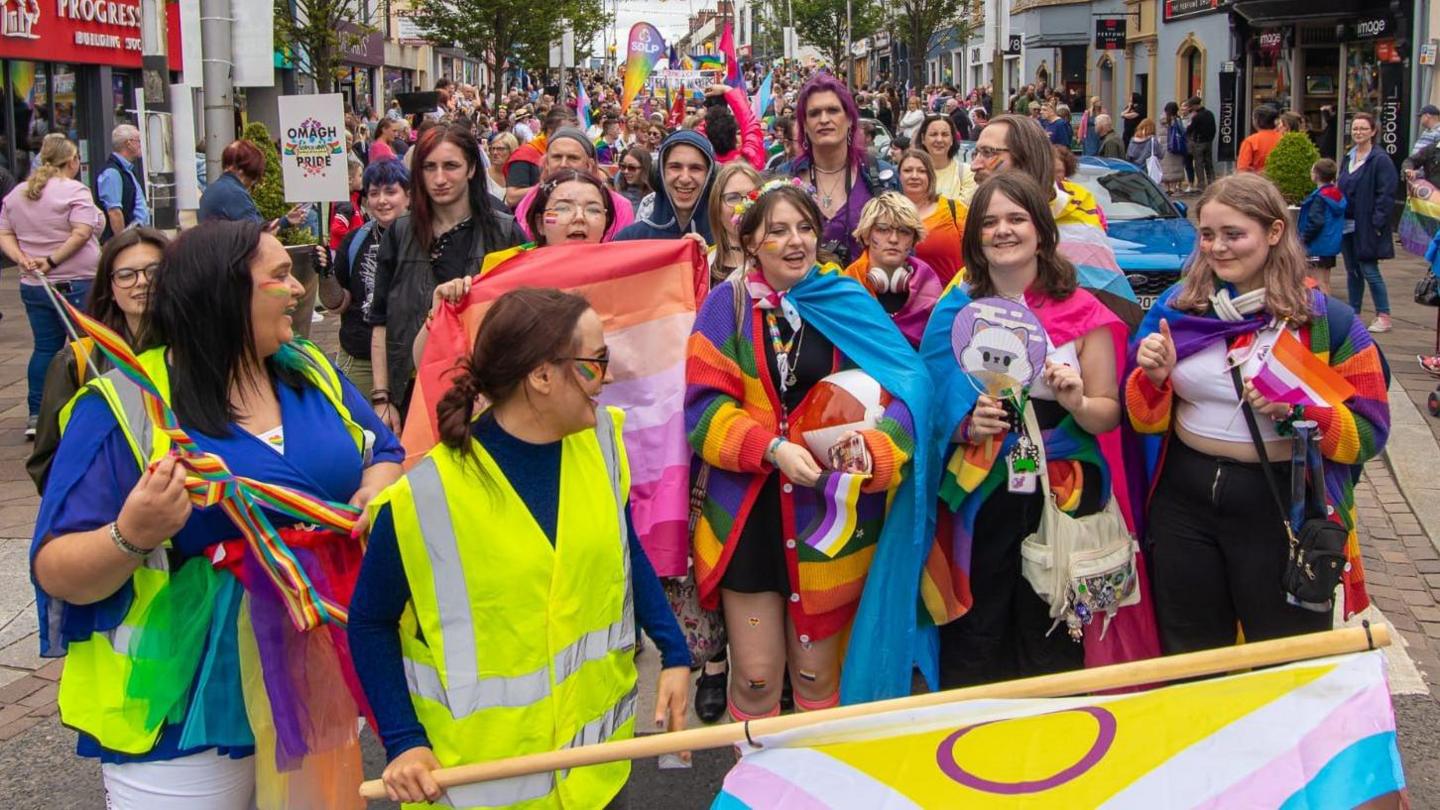Ambulance Service will not participate in Pride
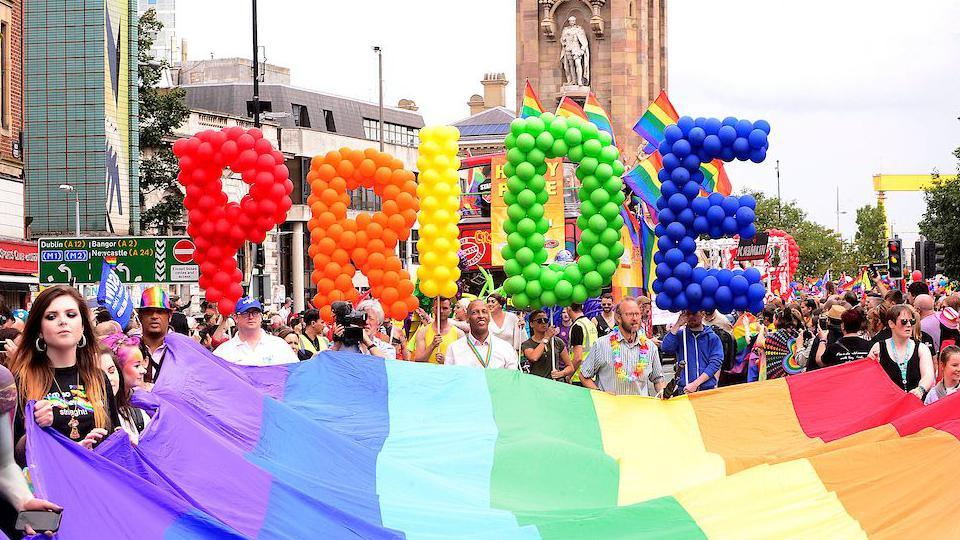
The four executive parties in Stormont's government were told they were not welcome to march in Saturday's Pride parade
- Published
The Northern Ireland Ambulance Service (NIAS) has said it will not be participating in Belfast Pride 2025 in an official organisational capacity.
It said its staff are welcome to attend voluntarily as part of the HSC (Health & Social Care) LGBT Staff Forum, not in uniform.
The BBC's Nolan Show understands that HSC bodies received legal counsel that they should not be seen to be participating in a protest against departmental policy.
Belfast Pride organisers are protesting against a ban on prescribing puberty blockers to under-18s and have told Stormont's executive parties they are not welcome at this year's march due to their support for the ban.
The four parties who voted for a permanent ban on the medication, which can suppress hormones, are Sinn Féin, the DUP, Alliance and the UUP.
Earlier, First Minister Michelle O'Neill expressed sadness that her party is not permitted to march in Belfast Pride this year.
The Sinn Féin vice president said she would still celebrate Pride "in my own way".
"I've always been an advocate for equality and human rights, so it does make me sad that they have taken the decision that they have taken," the first minister told the BBC.
Stormont's Agriculture Minister Andrew Muir, who is gay, has said he will be taking part in Belfast Pride in a "personal capacity".
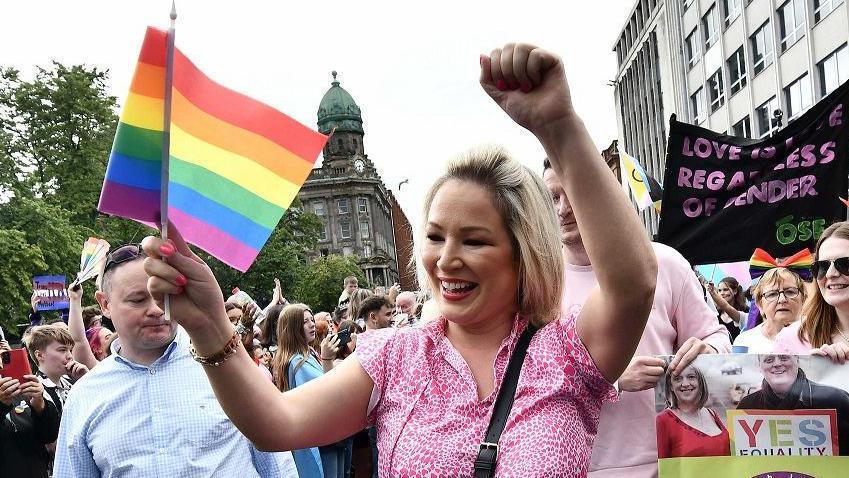
Michelle O'Neill has walked with party colleagues in previous Pride parades
Thousands of marchers and spectators are expected in Belfast city centre for the Pride parade on Saturday.
The majority of Pride parades across Northern Ireland have taken a similar decision and asked the executive parties not to attend.
A message from Pride organisers in the official guide to the event says the theme for this year is "no going back".
"Around the world and here at home LGBTQIA+ rights are being questioned, challenged and rolled back. In the face of that, we are standing tall and speaking up.
"Pride is power, Pride is protest, Pride is community, we cannot afford to be complacent, we will not go backwards."
BBC News NI reported earlier this week that the head of the Northern Ireland Civil Service (NICS), Jayne Brady, was warned it would be "open to the charge of acting politically" by taking part in Belfast Pride.
But O'Neill added it was "the right approach" for the NICS to participate in the event as it is one of Northern Ireland's largest employers with over 24,000 staff.
"We are an inclusive employer, and I think it's absolutely appropriate that the head of that service should be there and walk in the celebration that is Pride on Saturday.
"We can't promote inclusivity and employ that many people and not actually turn up on the day of celebration," she said.
The Alliance politician Andrew Muir also defended the NICS continuing to take part in Belfast Pride.
Muir said there has been "an awful lot of nonsense frankly that's been talked around Pride".
"And I think there's an agenda from some people to push back the rights of LGBTQIA+ people in Northern Ireland, and I'm not going to be part of that," he added.
Lynn Millar, interim co-chair of Belfast Pride festival, said the rights of the transgender community were "under threat" as a result of the ban.
"We're acting on what our trans community wanted us to do," Ms Millar told the BBC's Good Morning Ulster programme.
"Pride has always been a protest. It started out as riots - we're not going back to that.
"We celebrate Pride as well, but there will always be a political element when it comes to human rights and I'm not going to apologise for that."
Ms Millar confirmed Pride organiser met representatives from Sinn Féin and Alliance to seek their support to lift the ban on puberty blockers.
"They weren't changing their views, they weren't going to push for the bans being removed," she said.
The organiser added that the remaining executive parties "didn't want to meet".
Ms Millar rejected the idea that banning political parties from Belfast Pride was the wrong approach.
She said: "Next year is our 35th Pride parade. We have struggled and fought so hard to get things to change. We still do.
"I would love some day for Pride to be purely a celebration.
"While any members of our community - any group within our community - are being treated unfairly, it will always be a protest."
What are puberty blockers?
Puberty blockers are drugs which work by suppressing the release of hormones and can be prescribed to children who are questioning their gender.
The move to ban them came after a report into children's gender services - the Cass Review - said there were "gaps in evidence" around the drugs.
In 2024, the Conservative government introduced an emergency ban on them being prescribed by private and European prescribers.
That temporary ban was extended to Northern Ireland in August 2024.
In December 2024 the Labour government announced an indefinite ban on giving puberty blockers to under 18s.
That was supported by all four of Stormont's Executive parties - Sinn Féin, the Democratic Unionist Party (DUP), Alliance and Ulster Unionist Party (UUP).
In recent years, the participation of some organisations in Northern Ireland Pride events has been seen as controversial.
Officers from the Police Service of Northern Ireland (PSNI) first paraded in uniform at the Belfast Pride event in 2017.
But in 2023, they were instructed not to wear police uniforms if attending Pride.
At that time, the PSNI said the decision was taken to comply with its obligations on impartiality.
In the same year, Belfast's Pride organisers banned Ulster Rugby from their march because of its ban on transgender women playing in female contact rugby games.
The Irish Rugby Football Union (IRFU) said it was disappointed but respected their decision.
- Published23 July
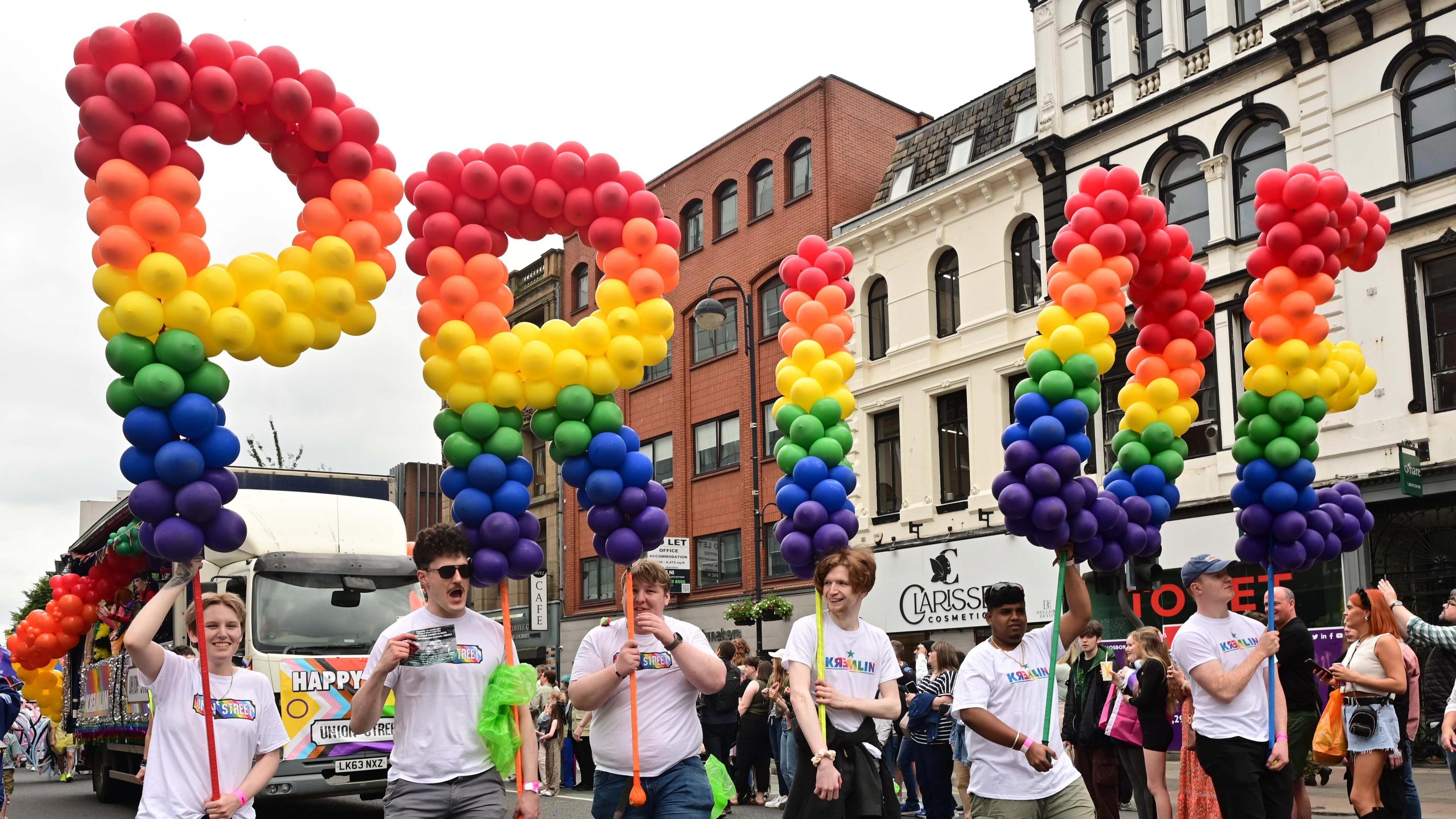
- Published21 March
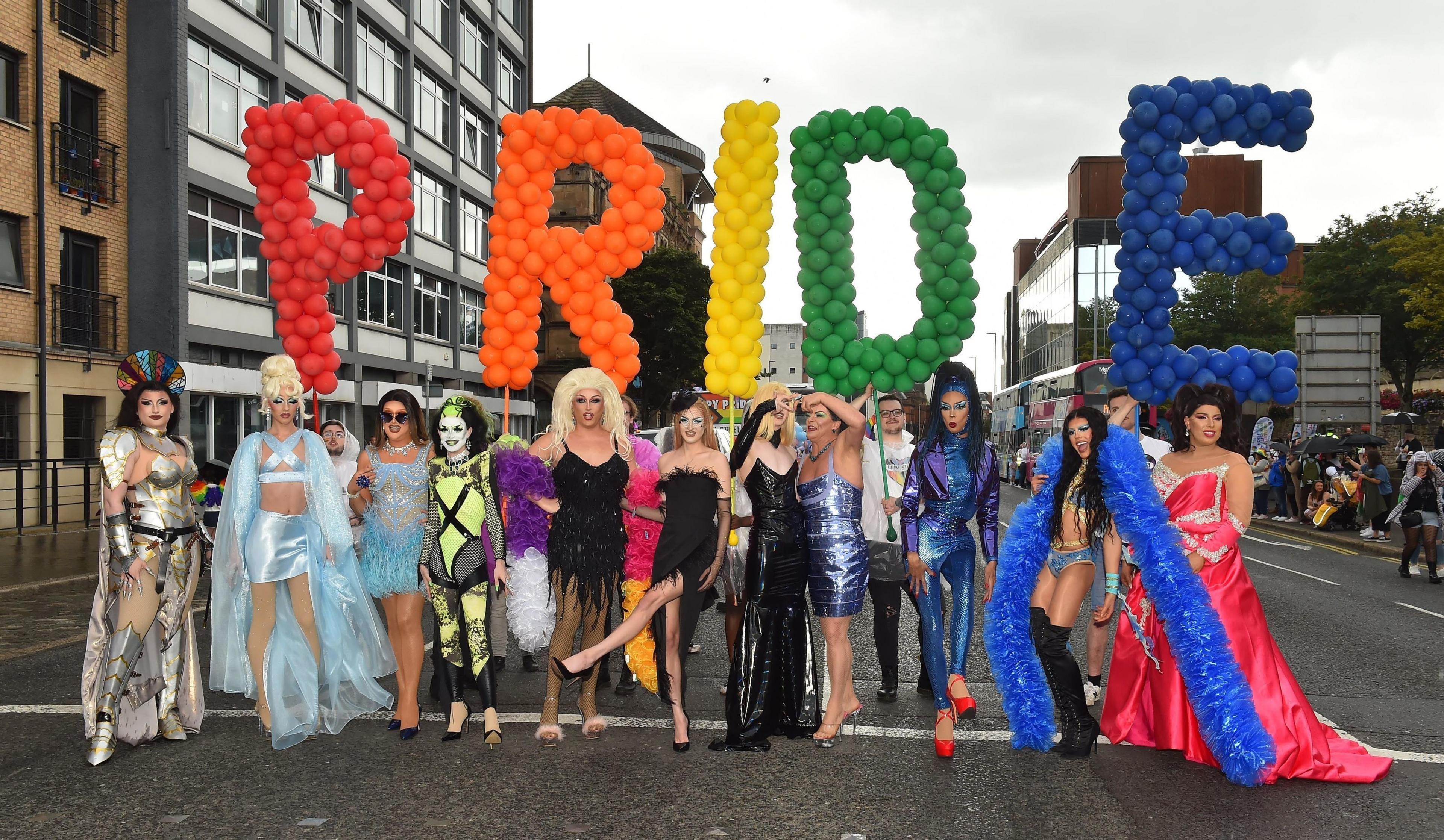
- Published13 February
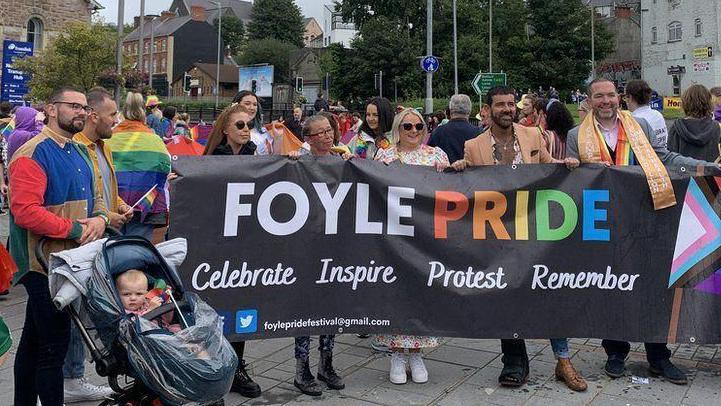
- Published14 July 2023
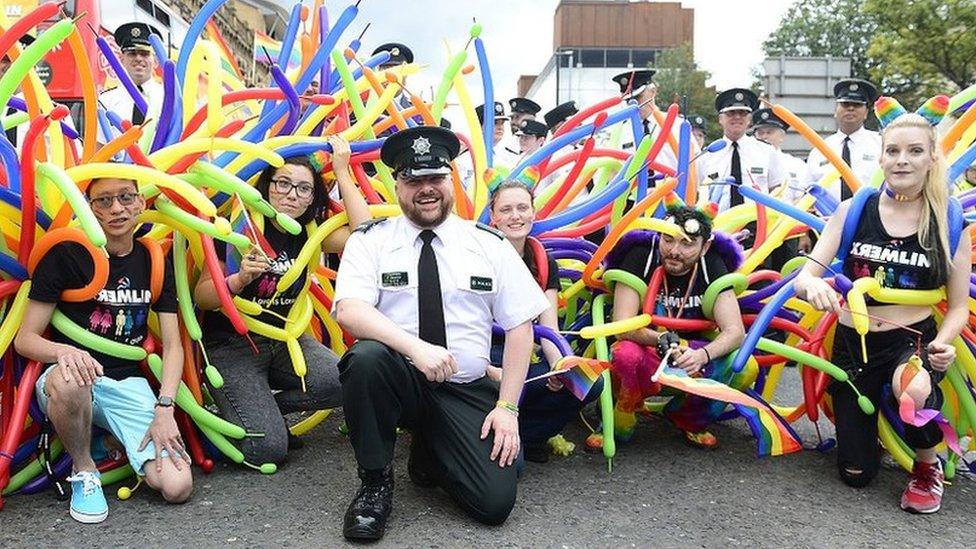
- Published14 June
